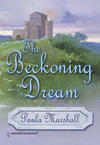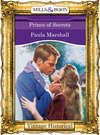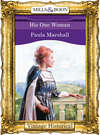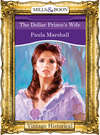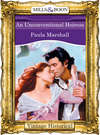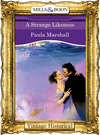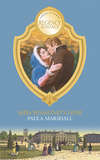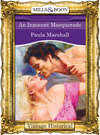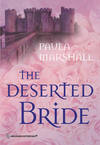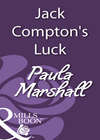Kitabı oxu: «The Beckoning Dream»
“You have made yourself at home, I see.”
Catherine could not help being acidic. He was here on sufferance, solely because she was being blackmailed into doing something she had no wish to do, in order to save her silly brother’s life, and Tom was already behaving like the master of the house.
He must learn—and learn soon—that he could take no liberties with her. Alas, his next words simply went to prove that he had every intention of doing so.
The Beckoning Dream
Paula Marshall
PAULA MARSHALL,
married with three children, has had a varied life. She began her career in a large library and ended it as a senior academic in charge of history in a polytechnic. She has traveled widely, has been a swimming coach and has appeared on University Challenge and Mastermind. She has always wanted to write, and likes her novels to be full of adventure and humor.
Author’s Note to the Reader
This novel, like all of mine, is firmly based on fact, and is dedicated to the memory of Aphra Behn, wit, poet, dramatist, novelist and secret agent, who lived the life of a free woman in the mid-seventeenth century—no mean achievement. It has taken three hundred years for her reputation to be revived and her many talents to be properly appreciated.
One of her greatest achievements as an agent in Holland was to warn the British Government in 1667 that the Dutch Navy was about to launch a major attack on the naval bases of Sheerness and Chatham on the River Medway. Her warning was ignored, as she recorded in her autobiography, and for three hundred years her biographers and critics mocked her for having claimed that, had the Government heeded her report, a major disaster for the British Navy would have been avoided.
Three hundred years later, Aphra’s claim was vindicated when her letter, giving details of the proposed attack, was discovered in the State Papers. In the same way, her right to be seen as the mother of the English novel and as the writer of a number of witty and actable plays was also derided until the Sixties of the present century when her work was looked at with fresh eyes.
Contents
Prologue
Chapter One
Chapter Two
Chapter Three
Chapter Four
Chapter Five
Chapter Six
Chapter Seven
Chapter Eight
Chapter Nine
Chapter Ten
Chapter Eleven
Chapter Twelve
Chapter Thirteen
Chapter Fourteen
Chapter Fifteen
Chapter Sixteen
Epilogue
Prologue
“True love is a beckoning dream.” Old saying
Two men from the court of King Charles II at Whitehall sat on the side of the stage of the Duke of York’s Theatre in the early spring of 1667. One of them was short and plump and was wearing a monstrous blackcurled wig. The other was tall and muscular; his wig was blond, and his hooded eyes were blue. Both of them were magnificently dressed and were wearing half-masks so that it was impossible to detect their true identity.
They were watching a play called The Braggart, or, Lackwit in Love, which had just reached the scene where, as the script had it, the following ensued:
Enter to LACKWIT, BELINDA BELLAMOUR, disguised as a youth, one LUCIUS.
LACKWIT Ho, there, sirrah! Art thou Mistress Belinda Bellamour’s boy?
BELINDA Nay, sir.
LACKWIT How “Nay, sir’? What answer is that?
Art thou not but just come from her quarters?
BELINDA Aye, sir, but nay, sir. Aye, sir, I have come from her quarters. Nay, sir, I am not her boy—my mother was of quite a different kidney!
So, aye, sir, nay, sir!
LACKWIT Insolent child! (Makes to strike her with his cane.)
BELINDA (Twisting away.) What is the world coming to when a man may be beaten for speaking the truth!
LACKWIT Man! Man! Thy mother’s milk is still on thy lips!
BELINDA Aye, sir—but it is not Belinda’s!
By now the audience—which was in on the joke of Belinda’s sex—was roaring its approval as Belinda defied Lackwit by jumping about the stage to dodge his cane, showing a fine pair of legs as she did so.
Master Blond Wig drawled at his dark friend, “Now that she has chosen to show them, her legs are better than her breasts—and they, when visible, were sublime. A new star for the stage.”
He took in the pleasing sight that the actress playing Belinda presented to the world in boy’s clothes; lustrous raven hair, deep violet eyes, a kissable mouth and a body to stiffen a man’s desire simply by looking at it!
“Aye,” agreed Black Wig, who was also appreciating Belinda. “And a new playwright, too. The bills proclaim that he is one Will Wagstaffe.”
“Will Wagstaffe!” Blond Wig began to laugh. “You jest, Hal.”
“Nay, Stair, for that is what the playbill saith. And the doxy who affects the boy is none other than Mistress Cleone Dubois, who made a hit, a very hit, as Clarinda in Love’s Last Jest by that same Wagstaffe whilst thou were out of town.”
“Did she so? I do not believe in Will Wagstaffe, and nor should you,” exclaimed Blond Wig. “But I have a mind to play a jest of my own.”
The action of the play had come close to them whilst they spoke, as Belinda and Lackwit sparred. Blond Wig picked a fruit from the basket that the orange girl had left before them, and threw it straight at Belinda, whom nothing daunted, either as Belinda playing a boy on the stage or in her true nature when not an actress. On seeing the orange coming, she caught it neatly and flung it back at Blond Wig as hard as she could.
He retaliated by rolling it across the stage towards her as though it were a bowling ball. Mr Betterton, the doyen of all Restoration actors, who was playing Lackwit, jumped dexterously over it, so that it arrived at Belinda’s feet.
She bent down, picked it up, and examined it before beginning to peel and eat it, segment by segment, exclaiming as she did so, “Why, Sir Lackwit, I do believe that the fruit thou hast refused is better than the wit. For that is dry, and this orange is juicy. I shall tell my Mistress Belinda that whilst you may have pith and self-importance, you lack the true Olympian oil which the Gods bestow on their favourites.
“But for the orange peel, this,” and she threw the shards of the peel straight at Blond Wig, who was on his feet applauding her improvisation, as were the rest of the audience.
“The doxy is wittier than the man who writes her lines,” exclaimed Blond Wig after bowing to the audience, who applauded him as heartily as they had rewarded Belinda. “And if you and the audience cannot see the jest in a man who writes plays calling himself Will Wagstaffe why, then, you and they are duller than I thought.”
“Enough of this,” whispered Betterton to Cleone as they grappled together in a mock and comic wrestling match. “Improvisation is well enough, and one of Rochester’s Merry Gang interfering with the action on stage may have to be endured, but you need not encourage him.”
“Need I not? But the audience, who is our master, approved.”
“Aye so, but we risk every fool in town wanting to be part of the play.” He turned himself back into Lackwit again in order to declaim in the direction of the pit, “Why, I vow thou art as soft as a very girl, Master Lucius. You need some lessons in hardening thyself.”
“Dost think that thou are the man to give me them, Sir Lackwit?”
The pit roared again. Some of the bolder members threw pennies on to the stage at Belinda’s feet. Blond Wig had produced a fan and waved it languidly in her direction.
“I vow and declare, Hal,” he whispered to Black Wig, “Master Wagstaffe is as bawdily witty as his master, the other Will.”
“And what Will is that, Stair?”
“Why, Shakespeare, man. Will Shakespeare. He who wags the staff. Is all the world as thick as a London fog in winter, these days?”
Black Wig couldn’t think of a witty answer to that. He might be Henry Bennett, m’lord Arlington, King Charles II’s Secretary of State who ruled England, but his wit was long term, carefully thought out, unlike that of his friend Blond Wig, otherwise Sir Alastair Cameron. Stair Cameron was known for his cutting tongue as well as his reputation for courage and contempt for everything and everybody. He was also known for his success with women.
And now, if Lord Arlington knew his man, his latest female target would be the pretty doxy on the stage who was back in skirts again, teasing and tempting Lackwit—as well as every red-blooded man in the audience. Her charms were such that she might even attract the attention of the King himself.
The pretty doxy on the stage was well aware that Blond Wig was making a dead set at her, as the saying went. At the end of the first Act, he bought a posy from a flower girl and tossed it to her as she left the stage.
She tossed it back at him.
In the second Act, he kissed his hand to her whenever the action on stage brought her near him.
Halfway through the third Act, Belinda pretended to woo Lackwit, and to allow him to woo her, her true lover, Giovanni Amoroso, being concealed behind a hedge to enjoy the fun. At the point when Lackwit had worked himself into a lather of desire, Blond Wig drew off one of his perfumed gloves and slung that in Belinda’s direction at the very climax of her scene with Lackwit.
“Why, what have we here?” she extemporised, holding up the glove. “What hath Dan Cupid sent me as a love token?” She sniffed at it. “Fie upon him, it hath a vile stink. He may have it back.”
And she slung it back at Blond Wig, who rose and bowed to her.
M’lord Arlington applauded him vigorously, whispering to his friend as he did so, “The wench will serve us well, will she not? Old Gower hath the right of it again. A pretty wit and a quick one. As quick as thine, Stair, I do declare.”
“But shallow, like all women’s wit, I dare swear. But I agree, she will do as well as another—and better than some. And mayhap she will tell me who Will Wagstaffe is, and where I may find the fellow.”
“Hipped on Wagstaffe, Stair?”
“Aye, hipped on any pretty wit—particularly one of whom I do not know.”
“Make the doxy thine, friend Stair, and she will tell thee all. Look, Lackwit hath learned that he truly lacks wit, and that Amoroso and Belinda are about to sing their love duet to signify that the play is over, and that he was cuckolded before he even wed his Mistress and made her wife!”
The play was, indeed, ending. Belinda was reciting the Epilogue, a poem in which she averred that she had followed the beckoning dream which led towards true love, and might now marry Amoroso.
“Truly a dream, that,” Stair whispered to Arlington. “But not the kind one of which the lady speaks. I can think of no nightmare more troubling than that which ends in marriage.”
The Epilogue over, Mistress Dubois, Betterton, and the pretty boy who played Amoroso linked hands and were bowing to the audience, which was on its feet again, applauding the actors. Blond Wig was shouting huzzahs at Belinda, who refused to look at him.
“To the devil with him,” hissed Belinda, or rather Mistress Cleone Dubois, to Betterton. “He tried to ruin all my best scenes. Another courtier come to entertain himself by destroying us.”
“He got no change from you, Cleone, my pretty dear. On the contrary, your quick wits had them laughing at him as much as you.”
“And who the devil is he? I know his friend, Sir Hal Bennett, late made Lord Arlington, but not the human gadfly in the blond wig.”
Betterton smiled and bowed, his head almost touching his knees before he led the company offstage, before saying, “Sir Alastair, known as Stair Cameron, Baronet. Rochester’s friend—everybody’s friend, aye, and enemy, too, gossip hath it. Avoid him like the plague that hath just left us. He would be no friend of thine, Cleone—or of any woman’s. Mark me this, he will be in the Green Room this evening, to pursue you further.”
“May God forbid,” Cleone shuddered. She trusted no man, least of all those who infested Charles’s court. “I want naught of him.”
But he wasn’t in the Green Room. Sam Pepys was there, and Lord Arlington, who bowed at Cleone and said in a butter-melting voice, “My felicitations, Mistress Dubois. You have grown since I last saw thee at Sir Thomas Gower’s when you were Mistress Wood. A very child, were you not?”
He tittered a little behind a fine white handkerchief edged with lace. “You look about you, mistress. Is it my friend you seek?”
The violet eyes were hard upon him. “Nay, m’lord. Unless it is to teach him manners—if indeed it were possible to teach him anything.”
Sam Pepys, standing by them, gave a jolly guffaw. “Come, come, mistress, you are too harsh. Stair Cameron is a right good fellow.”
Cleone rounded on him, shaking her fan in his direction, Belinda’s fan. She knew who Sam Pepys was. The Secretary to the Navy, a womaniser and a gossip—but there was no harm in him.
“Fie upon you, too, sir. What, I wonder, would you say, if Stair Cameron entered your office and upset the contents of your inkpot on your newly written letter to your master, the King, ruining it? Would you think the destruction of your work a jolly jest to be applauded? For such were the offences he committed against me!”
Lord Arlington clapped his hands together, and even Sam himself joined in the joke. “Why, madam,” m’lord offered, “you are as spirited a lady as you were a lass. I should introduce you to Sir Stair. How the fur and the feathers would fly, for I vow that in spirit you are well matched.”
Cleone stared at him, nothing daunted by his name or his position, something that pleased the man before her mightily. Oh, he had plans for Mistress Wood, also named Mistress Dubois, great plans. And now he could go to Sir Thomas Gower, his spymaster supreme, to tell him that Cleone Dubois was a lass of spirit who would serve them well.
What she said next had him laughing again behind his lace-gloved hand. “For,” smiled Cleone, “it would please me greatly never to see Sir Stair Cameron again, either on stage, or off it. Unless it were to hand him such a congé from a woman as he has never received before. But enough of him. To talk of him wearies me. What thought you of the play, m’lord?”
Graciously, m’lord Arlington told the lady that he had enjoyed it, his smooth face even smoother than usual.
And all the time he was laughing to himself as he thought of the delightful possibility that the spirited lady and her tormentor might soon meet again—and wondered which of them would come off the best, as the fur and the feathers would inevitably fly like the orange, the posy and the perfumed glove!
Chapter One
1667
“Who the devil can that be at this hour, Catherine?”
Rob Wood had just carved himself a large chunk of cold bacon for his breakfast to go with the buttered slice of bread that his sister, whom he always insisted on calling by her true name, had cut for him.
He had no sooner transferred the bacon to his pewter plate than a vile hammering had begun on the door of their small house in Cob’s Lane, London, not far from the Inns of Court where Rob was studying to be a lawyer. Or was supposed to be studying.
Rob was as idle as his sister was diligent. The only hard work he did was to write pamphlets attacking the rule of King Charles II and praising that of the late usurper and regicide, Cromwell. This was a particularly foolish act since England was at present at war with the Netherlanders—fighting them in order to prevent them from seizing the major share of the world’s trade. Opposition to the king was thus bound to be seen as treason.
Catherine, who was busy buttering a slice of loaf for herself, said crossly, “Answer the door, Rob. Don’t stand there yammering. It’s probably Jem Hollins come to clean our chimneys.”
Grumbling, Rob rose to do as he was bid. Although he was living entirely on his sister’s earnings in the theatre, he resented that fact rather than being grateful for it. Their father, once a rich country gentleman, had supported Cromwell in the late Civil War. Charles II’s Restoration had seen his estates confiscated; he had died penniless, leaving his two children to make their own way in the world.
Rob thought of himself as a dispossessed Crown Prince and behaved accordingly.
He never reached the door. Tired of trying to attract their attention, the Woods’ importunate visitors ceased their knocking abruptly.
Shouting “Ho, there, take heed and attend to us,” they knocked down the house door with iron-tipped staves of wood, before rushing in, seizing Rob and throwing him to the floor.
A third man, carrying a large piece of parchment importantly before him, put one foot on the struggling Rob, whilst a fourth placed himself between Catherine and her brother in case she tried to come to his assistance.
“By what authority—?” she began, using all the power of her stage voice to try to overawe them.
“By the authority vested in me by his most noble majesty, King Charles II, I hereby arrest Robert Wood for the crime of high treason, and detain his sister Catherine Wood, also known as Cleone Dubois, actress and whore, for questioning as to his activities.”
“My sister’s no whore,” shouted Rob as he was hauled to his feet, his hands pinioned behind his back, “and I know of no law which says that a man may not speak or write freely of his opinions—unless you have just invented one.”
If only Rob would learn to keep silent when challenged he would not find life so difficult, mourned Catherine as the leading tipstaff struck her brother across the mouth, bellowing, “That should silence your lying tongue, you treacherous rogue.”
He and two of his fellows began to drag Rob outside. The fourth seized Catherine roughly by the arm with one hand, while running the other across her breasts.
Hissing at him, “No need of that, I have no desire either to have you fondle me, or to escape,” Catherine brought her high-heeled shoe down hard on his instep. The tipstaff let out a shrill cry before striking her across the face with such force that she was thrown against the wall.
“Had I the time, you insolent bonaroba, you whore, I’d serve you as a man should serve a whore—later, perhaps,” he roared at her as she tried to recover her balance.
And who am I to criticise poor Rob for not keeping his tongue under guard when I can’t keep mine shut, either? Catherine thought as she walked painfully into the street. Outside a small crowd had gathered to watch the two Woods dragged away. She looked around her; where are they taking us? To prison? To Newgate? Or to the Tower of London itself?
She was destined for none of them, it seemed. She and Rob were half-walked, half-dragged to the nearest wharf on the Thames where two wherries were waiting. Rob was shoved into one, and she into the other.
The last she saw of him was his wherry making for the Tower, whilst she was rowed off in the opposite direction. To the Palace of Whitehall, no less, the King’s home in London, and consequently, the seat of government. Catherine’s mounting curiosity almost overcame her fear for herself, even as she worried over poor Rob’s ultimate fate.
No time for that, though. She was bustled along Whitehall’s gravelled walks towards one of the many buildings that made up the Palace precincts. The tipstaffs waved their staves, doors were opened for them, and presently, after traversing a number of long corridors, they came to a pair of double doors, on whose panels the tipstaffs knocked more subserviently than they had done in Cob’s Lane.
Beyond the doors was a largish room, one wall of which consisted almost entirely of latticed windows looking out on a garden. A number of finely dressed gentlemen were standing about, but they left the room even as Catherine entered it.
At the opposite end from the doors was a long table, where a man whom she immediately recognised sat in state. Behind him, covering the whole wall, hung a huge tapestry showing the Greeks pouring out of the Wooden Horse to capture and destroy Troy.
Catherine had no time to admire wall hangings. She was too busy staring at Sir Thomas Gower. Sir Thomas had taken her father, Rob and herself into his household for a short time after King Charles’s Restoration had made them homeless. He had been as kind to her father as his position as a powerful Royalist had permitted him to be.
Why had she been brought here? She was soon to find out.
“Come here, Mistress Wood,” Sir Thomas bade her, and then, “Bring the lady a chair, she seems distressed. Place it before me. Sit, sit,” he commanded her as she walked slowly forward, rubbing her arm, bruised where the tipstaff had seized it.
Now that she was near to Sir Thomas, Catherine could plainly tell that he had aged since she had last seen him. His face was lined with over sixty years of life, but he still possessed the calm gravity that had been so different from her father’s impotent rage at what had happened to his pleasant life.
She could also see that level with herself, and in front of Sir Thomas’s grand oak table on which books, ledgers and parchments stood at one end, was an armchair in which a man lounged. A man who was staring at her, not with Sir Thomas’s kind and paternal stare, but hungrily, almost ferally, his blue eyes cruel.
Bewildered, but still retaining the steady calm for which her fellow actors admired her, Catherine returned Sir Thomas’s grave look. She must not show her fear, but must keep her head so that Rob might not lose his, and pray that there might be a way out of the dire situation in which he had placed them.
“My dear Catherine,” said Sir Thomas, kindness itself, “I fear that your condition—or perhaps I should say, your brother’s condition—is a sad one. Treason!” He shook his grey head helplessly. “An ugly word, my dear. Nevertheless, God willing, we might find a way through the wood for you.”
What wood was he speaking of? The good old man, Catherine thought dazedly, was being so tactful that she hardly knew what he was saying. The lounging fellow on her right, whose eyes were still so hard on her that she could feel them when she could no longer see them, grunted “Ahem’ in a meaningful tone—although his meaning escaped Catherine!
But apparently not Sir Thomas, for he threw a sideways glance at his unmannerly aide, and said smoothly. “Ah, yes, Mistress Wood. I must be plain. We are not engaged in one of Master Wagstaffe’s comedies, are we?”
“No, indeed,” agreed Catherine.
“Whoever Master Wagstaffe is,” drawled the lounging man. “Another mystery.”
“No matter.” Sir Thomas was a little brisk. “I put it to you, Mistress Wood, that you do not share your brother’s Republican views.”
“I doubt—” and now Catherine was dry “—that he shares them himself. Rob is a weathercock. An attack of the megrims and he is all for the late usurper. If the weather is fine, and there is good food on the table, then it is ‘God save King Charles II’.”
Sir Thomas was suave. “All the more reprehensible of him, then, mistress, to put his life in jeopardy by writing treason. You, I understand, are a good and loyal subject of the King?”
Since his question seemed to invite the answer “Yes”, Catherine gave it to him.
“Oh, excellent,” smiled Sir Thomas. “So you would be willing to do the state some service. You speak Dutch, mistress, do you not? Your late mother being a Netherlander, as I remember.”
This seemed neither here nor there, and its relevance to poor Rob seemed questionable, but doubtless there was some point to this that escaped her. The lounging man was fidgeting again.
Sir Thomas gave him a benevolent stare. “Patience, Tom Trenchard, patience. We are almost at the heart of the matter.”
“Oh, excellent,” drawled Tom Trenchard, mocking Sir Thomas’s earlier remark. “I had thought that we were trapped in the outworks for ever.”
This time Catherine favoured him with a close examination, particularly since Sir Thomas was allowing him more freedom than was usually given to an underling. The principal thing about him was that he was big, much bigger than any of the men in Betterton’s company.
His shoulders were broad, his hands large, and he appeared to be at least six feet in height. His hair, his own, was of a burning red gold—more gold than red. It was neither long like the wigs of the King’s courtiers, nor cropped short like one of Cromwell’s Roundheads, but somewhere in between. It was neither straight nor curly, but again, was also somewhere in between, waving slightly.
His clothes were rough and serviceable. His shirt had been washed until it was yellow, and the weary lace at his throat and wrists was darned. His boots were the best thing about him, but even they were not those of a court gallant. Neither was his harsh and craggy face.
She already knew that he was mannerless, and he gave off the ineffable aura of all the soldiers whom she had ever met, being wild, but contained. Or almost contained. He saw her looking at him, and nodded thoughtfully. “You will know me again, mistress, I see.”
“Do I need to?” Catherine countered, and then to Sir Thomas, “Forgive me, sir, for allowing my attention to stray,” for she knew that the great ones of this world required all attention to be on them, and not on such lowly creatures as she judged herself and the lounging man to be.
He forgave her immediately. “Nay, mistress, you do well to inspect Master Trenchard. You will have much to do with him. As you have not denied either your loyalty, or your knowledge of Dutch, I am putting it to you, mistress, that you might oblige us by accompanying him to the Netherlands, there to use your skills as a linguist and as an actress. You will join him in an enterprise to persuade one William Grahame, who has done the state some service in the past, to bring off one final coup on our behalf.
“William Grahame has indicated to us that he is in a position to give us information about the disposition of the Dutch army and their fleet. He has also said that he will only do so to an emissary of my office who will meet him in the Low Countries at a place of his choosing. Once he has passed this information to us, and not before, your final task will be to bring him safely home to England again. He is weary of living abroad.”
He beamed at her as he finished speaking. Tom Trenchard grunted, mannerless again, “And so we reach the point—at long last.”
“Tom’s grasp of diplomacy is poor, I fear,” explained Sir Thomas needlessly. Catherine had already gathered that. She was already gathering something else, something which might help Rob, even before Sir Thomas mentally ticked off his next point.
“You must also understand, mistress, that success in this delicate matter—if you agree to undertake it—would prove most beneficial when the case of Master Robert Wood comes to trial—if it comes to trial, that is. The likelihood is that, with your kind co-operation, it will not.”
“And if I refuse?” returned Catherine.
“Why then, alas, Master Robert Wood will pay the price for his folly on the headsman’s block on Tower Hill.”
“And if I accept, but fail, what then?” asked Catherine.
“Why then, you all fail. Master Tom Trenchard, Mistress Catherine Wood and Master Robert Wood. Such may—or may not be—God’s will. Only He proposes and disposes.”
“Although Sir Thomas Gower makes a good fist of imitating Him,” drawled Tom Trenchard. “Particularly since it will not be his head on the plate handed to King Herod, whatever happens.”
So there it was. The price of Rob’s freedom was that she undertake a dangerous enterprise—and succeed in it.
“I have agreed with Master Betterton—” Catherine began, but Sir Thomas did not allow her to finish.
“Nay, mistress. I understand that Master Wagstaffe’s masterpiece has its last showing tonight—at which you will, of course, be present to play Belinda.
“Moreover, Master Betterton would not, if asked by those who have the power to do so, refuse to release you for as long as is necessary. Particularly on the understanding that, when you return, you shall be the heroine of Master Wagstaffe’s proposed new play—The Braggart Returns, or, Lackwit Married. I look forward to seeing it.”
This time the look Sir Thomas gave her was that of a fellow conspirator in a plot that had nothing to do with his bully, Trenchard, or with William Grahame in the Netherlands. Unwillingly, Catherine nodded.
“To save Rob, I will agree to your demands.” She had been left with no choice, for Sir Thomas had not one hold over her but two. The greater, of course, was his use of Rob to blackmail her. The lesser was his knowledge of who Will Wagstaffe really was.
And it was also most likely sadly true that the only reason why the authorities—or rather Sir Thomas Gower—had ordered poor Rob to be arrested was to compel her to be their agent and their interpreter.
“That is most wise of you, Mistress Wood. Your loyalty to King Charles II does you great credit.”
To which Catherine made no answer, for she could not say, Be damned to King Charles II, I do but agree to save Rob’s neck. Tom Trenchard saw her mutinous expression and read it correctly.
“What, silent, mistress?” he drawled. “No grand pronouncements of your devotion to your King?”
“Quiet—but for the moment. And I have nothing to say to you. Tell me, Sir Thomas, in what capacity will I accompany Master Trenchard here?”
Pulsuz fraqment bitdi.

